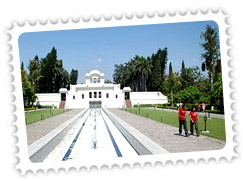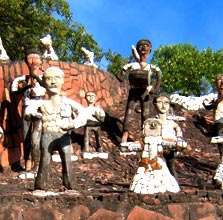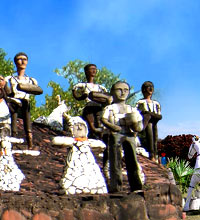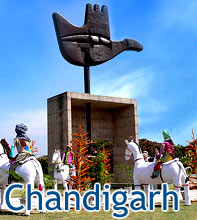 Pinjore Gardens, also called Yadavindra Gardens, represent one of the most travelled excursions from Chandigarh. Located at Pinjore, in the state of Haryana, they fall at a distance of about 22 km from the 'City Beautiful', on the Chandigarh-Kalka Road. The gardens lie at the foothills of the lower Shivalik ranges and stands as an apt example of the Mughal Garden style. Spread over an area of 100 acres, Pinjore Garden serve as the venue of the annual Mango Festival. The gardens house a mini zoo, historic places, Japanese garden, nursery and a number of picnic spots. According to the Hindu Mythology, the Pandava Brothers rested here during their exile.
Pinjore Gardens, also called Yadavindra Gardens, represent one of the most travelled excursions from Chandigarh. Located at Pinjore, in the state of Haryana, they fall at a distance of about 22 km from the 'City Beautiful', on the Chandigarh-Kalka Road. The gardens lie at the foothills of the lower Shivalik ranges and stands as an apt example of the Mughal Garden style. Spread over an area of 100 acres, Pinjore Garden serve as the venue of the annual Mango Festival. The gardens house a mini zoo, historic places, Japanese garden, nursery and a number of picnic spots. According to the Hindu Mythology, the Pandava Brothers rested here during their exile.History
Early in the 17th century, Nawab Fidai Khan, a reputed architect and the cousin of Mughal Emperor Aurangzeb, made the design for the Pinjore Gardens. At that time, the Nawab was the Governor of the Province and during one of his tours, he happened to visit the Pinjore valley. He was so enchanted with the beauty of the place that he thought of making a beautiful garden there and this is how the concept of the gardens came into being. The Nawab designed the garden as per the classical Charbagh pattern and introduced a central waterway in the area. He planned both sides of the waterway to be planted with the patches of green bordered with flowers, along with cover the entire place with a number of trees, like traditional palm, cypress and magnolia.
While Pinjore Gardens were still being created, goiter struck the women of the place. The courtiers of the Nawab immediately left the place, which forced him to quit as well. The palace later fell first under the reign of Raja of Sirmaur and finally, in 1775 AD, under Maharaja Amar Singh of Patiala. The latter consolidated Pinjore to his lands. He had a great admiration for the beauty engulfed in the garden and used to visit the place frequently. Amar Singh is credited with to improve the garden manifold. In 1966, Haryana was declared as an independent state and Pinjore Garden was handed over to it. Today, the garden continues to be one of the prime attractions of Haryana.
Features
Pinjore Garden is built in the typical Mughal style. It has a sloping ground and is adorned with fountains and grand pavilions. However, it differs from the other Mughal Gardens in respect that the seven terraces at Pinjore, instead of ascending, descend into a distance, creating a magical sight. The garden is full of varied species of beautiful, aromatic flowering plants, big trees, mango orchards, litchi orchards and several shrubs. The garden presents cool, shady walks and flagged pathways, which run to the reaches of the creeper-covered walls.
Recently, the end structure of the doorway was made into a disc-like open-air theatre. The stiff outer wall of the garden is suggestive of the fort walls, which has now all around dieter pavilions housing the zoo. A watercourse traipsing from level to level sparkles in the sunlight, its pools reflecting white shining pavilions and balconies etched high against a blue sky. The stylishly arched balconies and shining fountains, luxuriant green lawns and murmuring watercourse, limpid pools, shady walks and colorful flowerbeds, unusual descending terraces and monumental gateways - all are carefully planned to give the magic effect.
Besides the greenery and nature, one can find other attractions within Yadavindra Gardens, like a mini zoo, historic places, Japanese garden, nursery, and a number of picnic spots. The gardens are brightly illuminated at night. There is a Jalmahal within the garden, which is presently used as a restaurant. The garden is open from 7am to 10pm. The entry ticket for the garden is Rs.20 per head. Special programs are organized in the garden during the festivals, like Baisakhi and Mango Festival, which attract visitors from every corner of the country.












